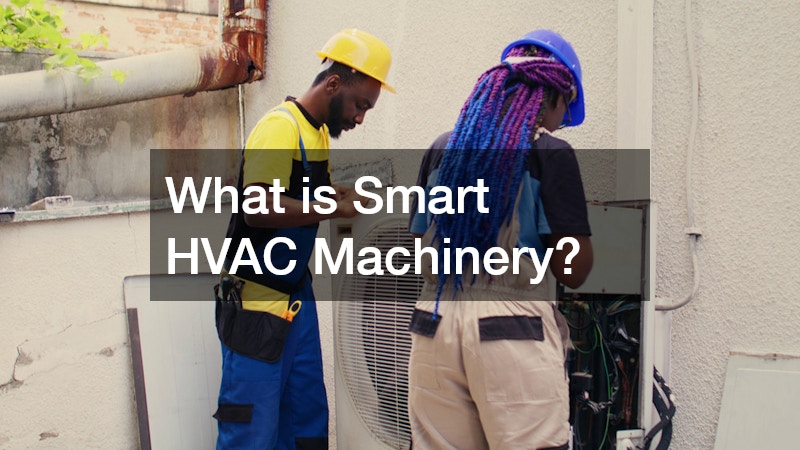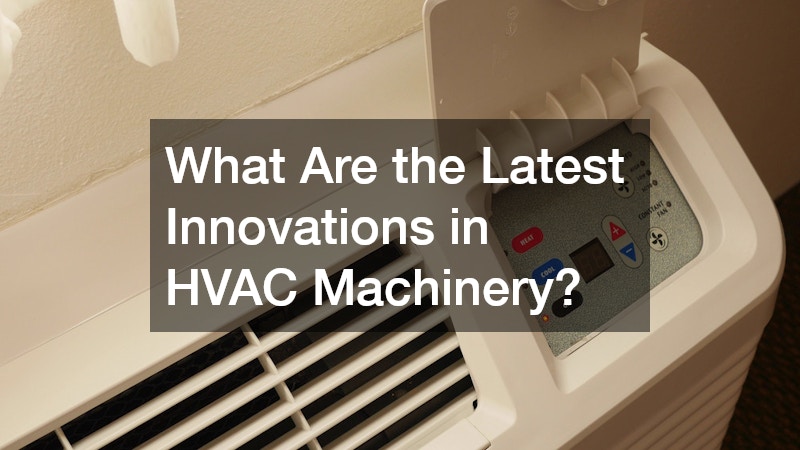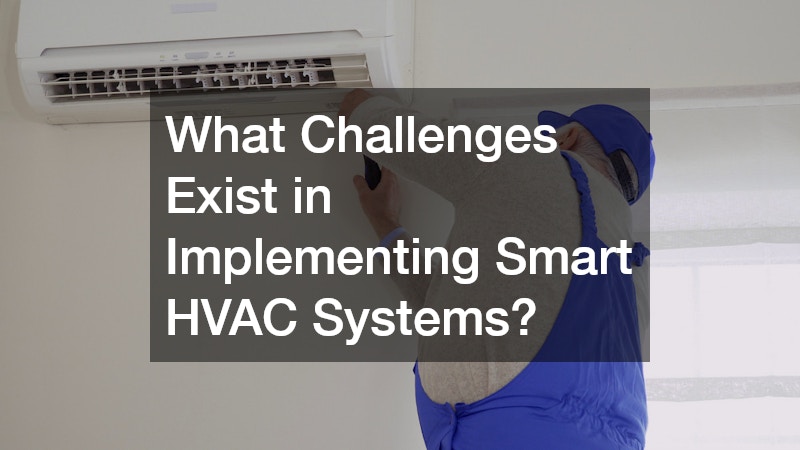Explore the intersection of technology and climate control as we delve into the emerging world of smart HVAC machinery and automation. The modern era demands higher efficiency and advanced operations from HVAC systems, making smart innovations essential. In this comprehensive guide, we’ll uncover how HVAC machinery is evolving and reshaping the industry landscape. Along the way, we’ll also consider the role of HVAC contractors and how HVAC products and services—from heating installation to air conditioner repair—are adapting to this new technological era.
1. What is Smart HVAC Machinery?

Smart HVAC machinery refers to climate control systems enhanced by technology to optimize temperature regulation, air quality, and energy usage. By integrating sensors and connectivity, smart HVAC systems offer unparalleled functionality compared to traditional setups. This evolution signifies a shift towards more responsive and aware HVAC solutions that benefit both residential HVAC and commercial HVAC environments.
A critical component of smart HVAC machinery is its ability to communicate with other devices to streamline operations. Through the Internet of Things (IoT), these systems can interact with smart thermostats, lighting systems, and even home automation devices. This level of integration allows for sophisticated control over residential HVAC settings, offering convenience that past generations could only imagine.
Moreover, smart HVAC solutions cater to both residential and commercial needs. For instance, commercial HVAC systems often require more robust solutions due to their scale and usage demands. Smart technologies allow businesses to manage heating installation and cooling processes more effectively, ultimately enhancing performance and reducing costs tied to HVAC service. These systems help keep shopping centers, office buildings, and schools comfortable while keeping operating costs manageable.
2. How Does Smart HVAC Automation Work?
Smart HVAC automation leverages advanced algorithms and sensors to maintain optimal environmental conditions within a space. These systems continuously monitor variables such as temperature, humidity, and air quality to deliver precise comfort levels. The seamless operation reduces the need for constant human intervention, making them highly effective in both homes and businesses.
At the core of smart HVAC machinery lies sophisticated software that processes data in real-time. By analyzing this data, the system can predict necessary adjustments to maintain comfort and efficiency. The result is a highly adaptive environment that caters to the unique needs of each user while reducing the frequency of costly HVAC repair services.
Connectivity is a fundamental aspect of smart HVAC automation. Systems often integrate with mobile apps, providing users the ability for remote control and monitoring. This connectivity simplifies air conditioner repair by allowing HVAC contractors to diagnose and fix issues promptly, enhancing service delivery and minimizing downtime. The same connectivity also improves water heater service, ensuring uninterrupted hot water availability at homes, gyms, and hotels.
3. What Are the Benefits of Smart HVAC Systems?
Smart HVAC systems offer significant benefits in terms of energy efficiency and cost savings. Automated controls ensure that HVAC machinery operates only when needed, reducing unnecessary energy consumption. This not only lowers utility bills but also supports environmentally-friendly initiatives, making HVAC service a long-term investment for families and businesses alike.
Improved comfort and convenience are tangible benefits of smart HVAC solutions. Users can personalize settings according to their preferences, creating a customized indoor climate. Additionally, features such as programmed schedules and remote operation enhance user convenience significantly for both residential HVAC and commercial HVAC systems. A homeowner can adjust settings while away on vacation, while a building manager can manage multiple units from one dashboard.
Maintenance and repair become more streamlined with smart HVAC systems. By continuously collecting operational data, these systems can predict when air conditioner repair or water heater service is needed. This proactive approach ensures that HVAC contractors can resolve problems early, keeping equipment in optimal working condition and extending the life of HVAC products. For example, a sensor detecting irregular airflow may trigger a service request before the issue escalates into a costly breakdown.
4. What Are the Latest Innovations in HVAC Machinery?

The latest innovations in HVAC machinery focus on sustainability and efficiency. Cutting-edge technologies such as variable refrigerant flow (VRF) systems and geothermal heat pumps offer advanced solutions for diverse applications. These innovations enable HVAC products to perform at peak efficiency while minimizing environmental impact. For residential HVAC users, this means reduced monthly bills. For commercial HVAC operations, it translates to thousands of dollars saved annually in large facilities.
Another notable innovation is the advancement of energy recovery systems. These systems capture waste energy from processes within the building and reuse it, significantly reducing energy wastage. Such technology is particularly beneficial for large commercial HVAC setups, where efficiency is paramount. A hospital or manufacturing plant using energy recovery systems can dramatically cut carbon emissions while maintaining uninterrupted comfort.
Integration with renewable energy sources is also an emerging trend in HVAC machinery innovation. Many systems are now designed to work seamlessly with solar panels and other renewable sources, promoting sustainable practices in heating installation and air conditioning service. This development marks a step forward in creating eco-friendly HVAC systems that align with stricter energy codes and sustainability goals worldwide.
5. How Do Smart Thermostats Integrate with HVAC Systems?
Smart thermostats enhance the capabilities of HVAC machinery by providing precise control over environmental settings. These devices learn user preferences and adjust the HVAC system’s operation accordingly. This adaptive learning results in optimized energy usage and improved comfort across residential HVAC systems and multi-unit commercial HVAC environments.
Integration between smart thermostats and HVAC systems is facilitated by IoT connectivity. Through wireless communication, these thermostats can control various aspects of HVAC operations, such as temperature settings and fan speeds. This is especially valuable in commercial HVAC systems, where efficiency and energy savings are crucial to managing large energy bills.
Smart thermostats also provide valuable insights into system performance. They track energy usage patterns and suggest ways to improve efficiency, acting as a partner in energy management. This feedback is invaluable for HVAC repair services, facilitating quicker diagnostics and enhancing the quality of both air conditioning service and heating installation. Over time, this can mean fewer service disruptions and more predictable maintenance schedules for homeowners and businesses alike.
6. What is the Impact of IoT on HVAC Automation?
The Internet of Things (IoT) has revolutionized HVAC automation by enabling devices to communicate and function cohesively. This connectivity allows for unprecedented levels of control and monitoring, transforming how HVAC machinery operates in both residential and commercial applications. IoT integration means HVAC systems can respond dynamically to real-time environmental changes like heat waves or sudden cold snaps.
IoT technology empowers HVAC services with predictive maintenance capabilities. By analyzing data from sensors, systems can anticipate potential failures and schedule HVAC repair services proactively. This forward-thinking approach reduces downtime for both residential and commercial HVAC installations. For example, a retail store can avoid mid-summer outages by relying on predictive alerts that recommend air conditioner repair before breakdowns occur.
Furthermore, IoT facilitates the creation of smart buildings where HVAC systems are part of a broader network of interconnected devices. Such environments enhance overall operational efficiency and deliver superior comfort. The comprehensive data generated by IoT-connected devices aids HVAC contractors in providing more customized air conditioning service and heating installation solutions that meet the unique needs of each property.
7. Are Smart HVAC Systems Cost-Effective?

Smart HVAC systems are inherently cost-effective due to their energy-saving capabilities. Optimized operations and minimal energy waste result in lower utility bills, providing significant financial savings in the long term. For commercial HVAC applications, cost reduction is even more pronounced given the scale of operations. A shopping mall, for instance, may save thousands annually by upgrading to a smart HVAC system.
Initial investments in smart HVAC machinery may be significant; however, the return on investment is realized through operational savings and prolonged equipment life. Smart systems require less frequent air conditioner repair and maintenance, reducing costs over time. Thus, these systems are a fiscally responsible investment for both residential and commercial spaces. Families also find value in reduced water heater service needs, which lowers household repair expenses.
Moreover, smart HVAC systems contribute to increased property value. Energy-efficient homes and buildings equipped with state-of-the-art HVAC products and smart technology attract higher market prices. Property owners benefit from the dual advantage of living in a comfortable environment while enjoying enhanced asset value. In competitive housing markets, an updated residential HVAC system with automation can be a deciding factor for buyers.
8. How Is AI Being Used in HVAC Machinery?
Artificial intelligence (AI) is playing a transformative role in HVAC machinery by introducing advanced automation and predictive capabilities. AI algorithms analyze vast amounts of data from HVAC systems to optimize performance and improve maintenance strategies. This analysis enables systems to adapt to user habits and environmental conditions autonomously, much like a digital caretaker for indoor comfort.
AI enhances the diagnostic capabilities of HVAC machinery, promoting more efficient HVAC repair services. By predicting potential malfunctions before they occur, AI helps in scheduling timely interventions. This proactive approach minimizes system downtime and extends the lifespan of HVAC components, improving both water heater service and heating installation reliability. Contractors are beginning to rely on AI data to make more precise recommendations for repair or replacement.
Moreover, AI-driven HVAC systems contribute to smarter and more sustainable energy consumption. They optimize heating and cooling cycles based on real-time data, reducing unnecessary energy use. AI integration ensures that HVAC machinery operates at peak efficiency, aligning with eco-friendly goals and resulting in better air conditioning service for users in homes, offices, and industrial facilities.
9. What Are the Environmental Impacts of Smart HVAC Technology?
Smart HVAC technology significantly reduces environmental impact through its energy efficiency and reduced emissions. By optimizing HVAC operations, smart systems decrease the overall energy demand, leading to lower carbon footprints. This reduction aids in combating global climate change, highlighting the importance of adopting smart HVAC solutions for both residential and commercial spaces.
Furthermore, smart HVAC systems facilitate the use of renewable energy sources, such as solar and wind. By integrating with these sustainable options, HVAC systems become an integral part of green buildings. This integration supports the movement towards reducing reliance on fossil fuels, further mitigating environmental harm while improving the sustainability of heating installation and air conditioning service projects worldwide.
In addition to energy savings, smart HVAC technology contributes to improved air quality. Advanced filtration and ventilation systems promote cleaner indoor environments, enhancing occupant health. The environmental benefits of smart HVAC machinery extend beyond energy conservation, fostering a healthier planet for future generations by reducing pollutants and supporting eco-conscious construction practices.
10. What Challenges Exist in Implementing Smart HVAC Systems?

While the benefits of smart HVAC systems are substantial, several challenges exist in their implementation. The initial cost and complexity of installation can be prohibitive, especially for residential HVAC users. Overcoming these financial and technical barriers is essential for broader adoption, and incentives such as tax credits or rebates may help homeowners make the transition.
Another challenge is the integration of existing HVAC systems with new smart technologies. Many older systems are not compatible with modern smart devices, necessitating extensive upgrades. Ensuring seamless integration requires expertise and can stretch the capabilities of traditional HVAC contractors. It also requires homeowners and businesses to evaluate whether they should retrofit current systems or invest in entirely new HVAC products.
Furthermore, concerns regarding data privacy and security are prevalent with smart HVAC technologies. As systems collect and transmit data, they become targets for potential breaches. Addressing these concerns requires robust cybersecurity measures to protect user information and maintain trust in HVAC products and services. Contractors and manufacturers alike must commit to building secure systems that customers can rely on for both comfort and safety.
Smart HVAC machinery and automation are at the forefront of transforming how we manage indoor climates with efficiency and precision. As technology evolves, these systems promise enhanced energy efficiency, unprecedented user comfort, and sustainability. Despite existing challenges, the future of HVAC machinery is promising, offering substantial benefits to residential users and commercial operators alike. The integration of AI, IoT, and renewable energy into HVAC service practices is setting the stage for a new era of climate control where heating installation, air conditioning service, water heater service, and hvac repair services are smarter, faster, and more efficient than ever before.



